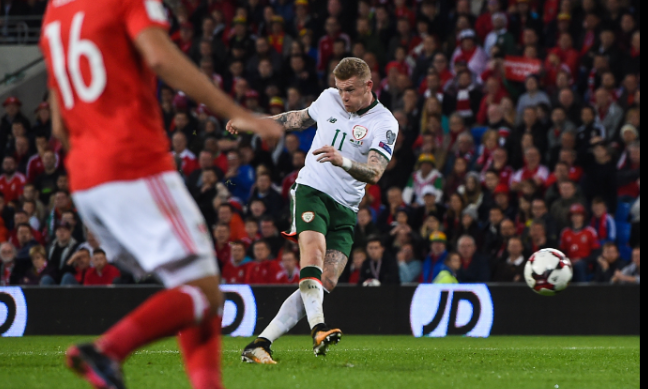You think you know a team. You think the team you think you know are meandering towards an inevitable and disappointing end to a campaign after a drab 2017.
And then something magical happens – a goal which represented the best of Martin O’Neill’s Ireland took the side to a World Cup play-off in November after an astonishing victory here in Cardiff. It was a goal which represented all that is good about the team and it was representative, in the most profound sense, of the country.
It was a goal set up by Jeff Hendrick, a Dublin boy who came up from the Whitehall nursery of St Kevin’s Boys. It was a goal imagined by Harry Arter, a second generation Irishman, whose moment of inspiration created the space which allowed the goalscorer to finish. And it was scored by James McClean, a man who represents Derry and represents Ireland as if every moment beforehand was just a preparation for this glory.
If those three combined for the goal, a team built the platform for this victory. From Darren Randolph through the outstanding centre-backs Shane Duffy and Ciaran Clark to the captain David Meyler, Ireland produced a memorable result at the end of a game which will only be remembered for McClean’s goal and Ireland’s extraordinary achievement. It was the most astonishing terrible game of football many of us will ever see.
But we shouldn’t be surprised. This was a victory that surpassed even the triumph in Vienna last November and given that Ireland had waited 30 years for a meaningful win away from home, it isn’t a coincidence that they have achieved two in 11 months.
McClean was the man who scored in Vienna and he has been the player who, in every sense, has come to represent the O’Neill era.
But, whatever happens next month, this is an era which has restored belief to the Irish side, even if it was hard to discern a Ireland strategy in the opening 25 minutes unless it was the rope-a-dope, an intention to let Wales play themselves out, to take no risks on the ball and bet that Wales couldn’t do anything when they had it.
This may have been the plan, but the unfortunate thing, if it is a plan, is that is so closely resembles chaos.
This chaos theory had Ireland chasing after the ball as Aaron Ramsey and Joe Allen controlled the midfield and, either by accident or design, Ireland surrendered possession. McClean made a crunching tackle early on and gave the ball away once in a dangerous area, drilled in a low cross that worried Wales and ran around with enthusiasm, but there was a lot more to come.
Worrying Wales was a rarity. Whenever Ireland got on the ball, it was with the knowledge that very, very shortly they wouldn’t be on the ball again.
If the atmosphere beforehand had been remarkable, the game was predictable. For the first 35 minutes, the game was familiar from an Irish point of view, but Wales couldn’t make the domination in midfield count for much.
Amazing what can happen when you don't pipe in music or drown out a crowd pic.twitter.com/VlbgOQc0iX
— Dion Fanning (@dionfanning) October 9, 2017
Wales threatened from set-pieces. Ben Davies shot over and Darren Randolph tipped over from Ramsey. Ireland, on the other hand, didn’t create so much as they hoped to achieve some sort of administrative advantage, appealing for a penalty when Shane Duffy tumbled in the box. Duffy had also shot wide, following a pirouette from Ciaran Clark which was the standout moment of skill from Ireland in the first half and told its own story.
Ireland needed their midfielders to do more on the ball, but Allen and Ramsey were dominating. Meyler was then penalised for a foul on Allen. He protested his innocence but Allen was groggy and was led along the touchline and out of the game.
Almost immediately, the match changed. Ireland sensed that there was room to play and, more importantly, the forfeit for losing the ball was not so high.
Hendrick came more into the game, demanding the ball from his defenders. Before that, he had made a mess of an opportunity in the box and personified Ireland’s inability to get on the ball.
The first meaningful action of the second half for Ireland involved a hotly contested throw in. If you want a side to contest a throw-in, Martin O’Neill team are your men.
But they were your men if you wanted some other things doing as well. Duffy and Clark fought for everything at the back while Meyler gave O’Neill all he would want from a midfielder in that position.
Around them, things were happening and the second half was more promising. Robbie Brady was getting forward and linking with Cyrus Christie, even if there was still a hesitancy that led moves to break down.
Then Hendrick pressed and got hold of the ball in the corner. His cross was heading for Arter but Arter’s dummy created the space for McClean. He needed to keep his composure and if anyone doubted him at that moment, he didn’t doubt himself.
O’Neill then sent on Glenn Whelan and a nation fretted.
“We have this now,” an Ireland fan said deep into injury-time. It was a statement which had a certain logic based on what he was watching as Wales looked gone, but it was a statement which seemed to be laughing in the face of all we know about Irish football. But it turns out we don’t know anything, that this is a side with the heart and commitment to challenge all we assume and, instead, make us believe again.












































